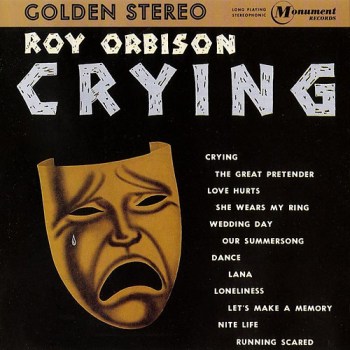
It’s said that when Roy Orbison, at one time a songwriter with little success as a singer, auditioned “Only the Lonely” for Colonel Tom Parker in hopes of getting Elvis Presley to perform it, the Colonel told Orbison that Presley could never reach the climactic high note (“Yoooooou’ve”), so he’d better record the song himself. Soon the gawky guy with dark glasses was “the Caruso of Rock” — actually, country pop — who, usually with co-writer Joe Melson, fashioned agonized or ecstatic arias uniquely suited to his reedy, three-octave range. Most songs presented a mood or an attitude; Orbison’s were often melodramatic playlets. In “Oh, Pretty Woman,” the singer spots a fine fox on the street and is about to give up on her when “what do I see?/ Is she walkin’ back to me?/ Yeah, she’s walkin’ back to me.” In “Running Scared,” Orbison is afraid his woman will go back to an old lover who has just returned, until “you turned around and walked away with me” — the last phrase ascending into a triumphant, countertenor empyrean.
In the Orbison-Melson “Crying,” the speaker analyzes his depression over a lost love and decides the condition is permanent. He was “all right for a while” until she showed up again, and a single act of nostalgic generosity — “You held my hand so tight” — triggered his tears. “I love you even more/ than I did before/ So darling, what can I do?” For two verses the song is measured, musically inventive and suspenseful. Will she walk back to Orbison, walk away with him? Not this time: “For you don’t love me/ And I’ll always be…” And finally comes the torrential title word, an impossible octave or two higher, registering the ecstasy of misery. It’s both a bravura performance and a depressive-manic, wrenching-frightening one. If your heart doesn’t break listening to “Crying,” consult a physician; you may not have one.
(Browse the All-TIME 100 Songs and more than 100 other pop culture lists on TIME’s Populist iPad app)
[youtube=http://www.youtube.com/watch?v=-l-AxZIdq4E]

